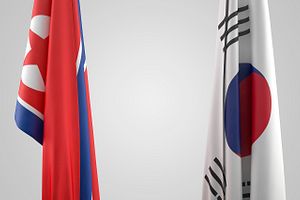The world got a scare earlier this week as rumors emerged about North Korean leader Kim Jong Un’s imminent death, spreading like wildfire across the internet and sparking speculation about everything from potential successors to U.S. responses. The problem is that we now know the news probably wasn’t true or was, at the very least, exaggerated.
The information started as a report from Daily NK that Kim recently underwent heart surgery — a report that they have now corrected to clarify was only based on one source within North Korea. Nevertheless, the story got picked up by CNN, which added that U.S. officials were monitoring reports related to Kim’s health. Suddenly, the world was waiting with bated breath to learn whether Kim was truly on his deathbed.
South Korea quickly responded. A Blue House spokesperson told Korean reporters that there has been “no unusual activity detected in North Korea.” A few days later, the South Korean Unification Ministry said they still had no reason to believe anything unusual was going on in the North, and that the country appeared to be conducting business as usual.
Nevertheless, as the rumors began flying the South Korean public was also captivated. Trending topics related to Kim on South Korea’s main search engine, Naver, spiked on Tuesday morning as the rumors spread, with Kim’s name trending alongside keywords like “surgery” and “grave condition” in Korean, and even “grave” and “grave danger” in English, with users likely trying to suss out what the English-language media were reporting on Kim’s condition.
Soon, the topic started picking up other defense-related keywords, including Korean defense firms Viktek and Hanhwa Aerospace, along with “방산주” (defense stocks) and “전쟁 관련주” (war-related stocks). Many defense companies experienced jumps of up to 30 percent on the Korean stock index KOSPI compared with the previous day amid the rumors that Kim may be dying, potentially creating a dangerous power vacuum on the Korean Peninsula. Meanwhile, some companies related to North Korean engagement, including those tied to the Kaesong Industrial Complex, experienced drops of more than 10 percent.
While these topics stayed in Naver’s trends for the rest of the day, within a few hours Kim had been replaced as the top trending item by stories about Japanese Prime Minister Abe’s inappropriately small face mask, as well as a fire in the city of Gunpo.
As the status of Kim remained unclear, much like the rest of the world, South Korean news quickly assessed contingency plans and what would happen should the rumors prove true. Many speculated that in the absence of a designated heir Kim’s younger sister, Kim Yo Jong, may have the highest likelihood of taking over in the case of Kim’s death.
This is not the first time that unverified information about North Korea has made the rounds, including rumors about Kim’s health. Usually, as in this case, these tidbits of information start off as reports in the South Korean media — often directly labeled as coming from only one source or explicitly labeled as analysis or speculation — and then get picked up by international outlets and amplified until they are repeated as established fact.
To be fair, it’s extremely hard to get one source of information about goings-on within the country, much less getting a second or third source to confirm. And because North Korea is so closed off and has built such a cult of personality around its leaders, almost any rumor coming out of the country seems potentially believable.

































